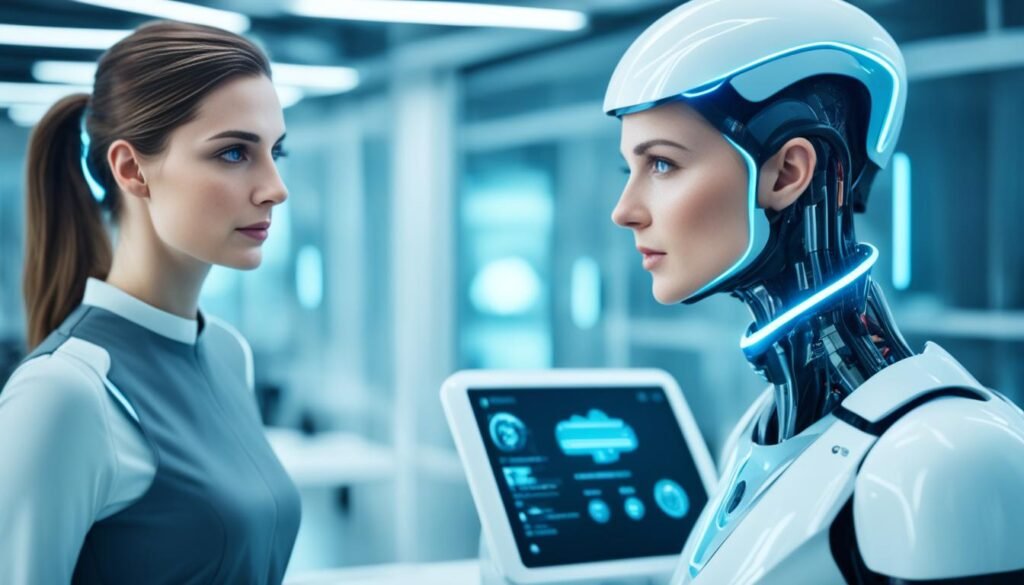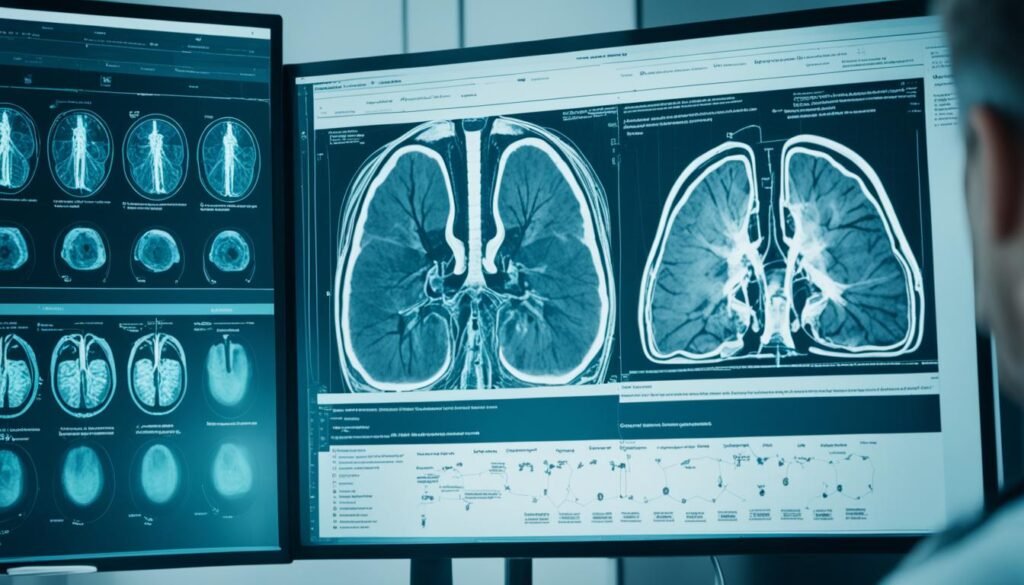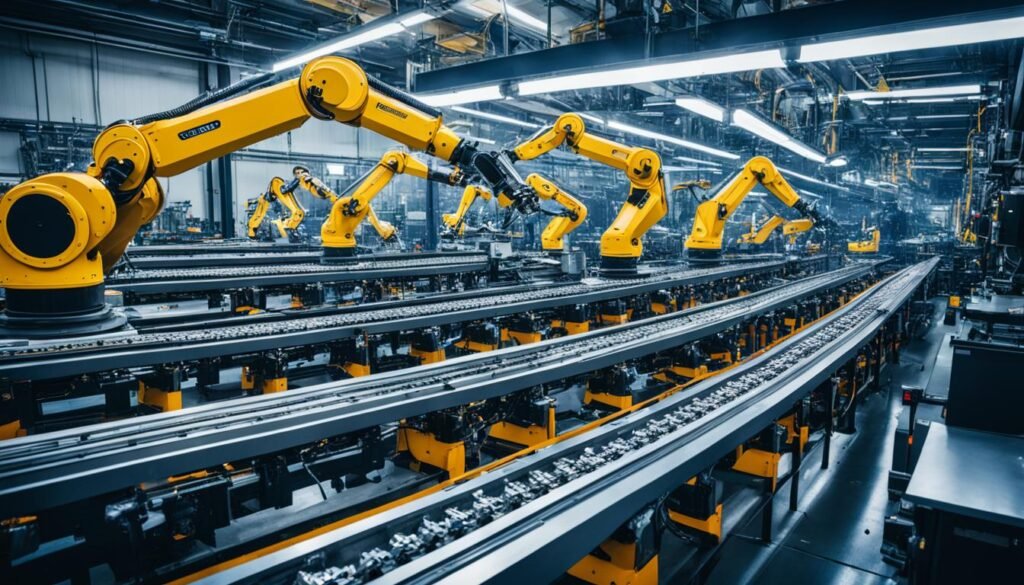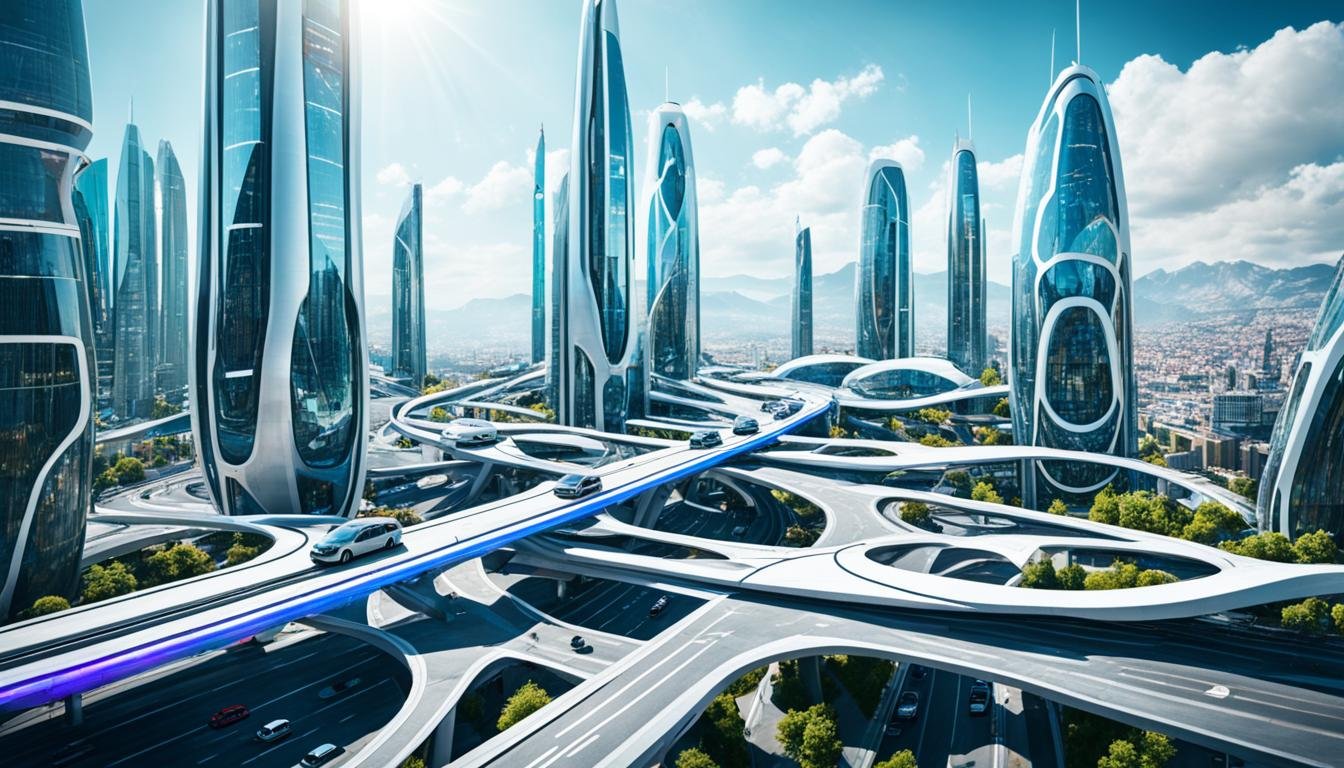A study by Statista shows the global AI market will grow by 54% each year. Artificial intelligence (AI) lets computers think and learn by themselves. It makes machines act like humans. There are three main types of AI: weak, strong, and super AI.
AI has many benefits but also some drawbacks. This article will show you how AI is changing your daily life and work for the better.
Key Takeaways
- The global AI market is poised for rapid growth, up to 54% annually.
- AI can simulate human intelligence and has various capabilities, from weak to strong to super AI.
- AI offers numerous benefits that are transforming industries and improving efficiency.
- This article will highlight the advantages of AI and its positive impact on your life and work.
- Understanding the types and capabilities of AI is crucial to appreciating its importance.
Introduction to Artificial Intelligence
Artificial intelligence (AI) has changed how we interact with the world. It makes computers think, learn, and do tasks like humans do. AI goes beyond just automating tasks. It gives machines skills to understand, reason, and act like humans.
Understanding the Concept of AI
AI lets computers think and learn by themselves. This tech uses algorithms, data, and computers to act like human intelligence. Adding AI to different things helps us do tasks better and more efficiently.
Types of AI: Weak, Strong, and Super AI
- Weak AI, or narrow AI, is the most common type today. It focuses on specific tasks, like Siri, Alexa, Watson, and self-driving cars.
- Strong AI, or Artificial General Intelligence (AGI), aims to be as smart as humans. It could be even smarter, but it’s still just an idea with no real examples.
- Deep learning is a part of machine learning that uses complex neural networks. It lets machines learn on their own from big data. Models like GPT-3 and DALL-E 2 can create text or images from data.
AI is getting more important in many areas. It’s changing how we solve problems, make decisions, and innovate. From healthcare to daily life, AI is making a big impact.
The future of AI looks bright, and we’ll need more experts in this area. Knowing about AI’s types and what they can do helps us use this tech to make progress and innovate.
Advantages of Artificial Intelligence
Artificial intelligence (AI) is changing the way we live and work. It brings many benefits to people, companies, and society. As AI grows, we see how it can make our lives better in many ways.
One big benefit of AI is it helps reduce mistakes. AI computers don’t make errors if they’re designed right. They use predictive analysis and data to make decisions. This means better efficiency, more productivity, and saving money in many fields.
- AI can do boring tasks like collecting data, entering information, customer service, testing software, and making invoices. This lets people focus on creative and strategic work.
- AI can look through big datasets fast, helping make quick decisions and finding important insights. This can lead to business success.
- AI chatbots offer customer support all the time, giving accurate info quickly. This cuts down on the need for human customer service people.
AI is also great at reducing risks in dangerous jobs. It can handle risky tasks like mining, exploring the sea, and rescues. This lowers the chances of harm to people.
In healthcare, AI is changing how we diagnose, treat, and predict diseases. AI systems look through lots of medical data to find patterns. They help doctors make better decisions, which can lead to better health outcomes for patients.
“AI is not just a technology, but a way of thinking and problem-solving that has the potential to transform our world in incredible ways.”
The AI market is growing fast worldwide. This shows the big benefits of this technology. By using AI, companies and people can find new chances, work more efficiently, and innovate. This can make our lives better and shape the future.

Reduction in Human Error
Artificial Intelligence (AI) greatly reduces errors and boosts accuracy and precision. AI makes decisions based on past data and algorithms. This setup minimizes errors almost to zero when done right.
AI in Robotic Surgery Systems
In healthcare, AI-powered robotic surgery systems are changing the game. They help doctors make better decisions and catch errors early. For example, a study found AI helping with medication for the elderly and spotting mistakes in neonatal care.
But, the World Health Organization warns against quick AI adoption. It could lead to more errors and lower trust in AI in healthcare. Luc Julia, who helped create Apple’s Siri, suggests “augmented human intelligence” to avoid mistakes in driving, medical checks, and electronics.
A study in Nuclear Engineering and Technology showed AI improving error detection in a nuclear plant. Célestin Sedogbo, an expert in language processing, explains how AI can prevent human mistakes. It helps by enhancing thinking and avoiding missing important details.
Using AI in many areas is very promising for cutting down on human errors. But, it’s key to make sure AI algorithms don’t have biases or unfairness. Gaël Varoquaux, a researcher, talks about the dangers of biased AI. He stresses the need to fix biases in data to stop AI from spreading them.
Enhanced Decision-Making Capabilities
Artificial Intelligence (AI) is changing how we make decisions. It uses lots of data and smart algorithms to improve decision-making in many fields, like healthcare. AI can look at complex info, find patterns, and give insights that make decisions more accurate, fast, and efficient.
AI in Healthcare Diagnosis
In healthcare, AI is key to better diagnosis. It can go through huge amounts of medical data, like patient records and test results. This helps doctors make more accurate and quick diagnoses. It also lowers the chance of mistakes and lets doctors act sooner, which means better care for patients.
For instance, AI can look at medical images like X-rays and MRIs better than humans. It spots tiny patterns and problems that doctors might miss. This means catching diseases like cancer and heart conditions earlier.
AI also helps make treatment plans that fit each patient’s needs. It looks at their medical history and other data to suggest the best treatment. This way, patients get better care and it can save money on healthcare.
| AI Capability | Healthcare Application | Benefit |
|---|---|---|
| Medical image analysis | Early detection of diseases | Improved patient outcomes, reduced healthcare costs |
| Personalized treatment recommendations | Tailored healthcare plans | Increased effectiveness of treatments, reduced healthcare costs |
| Predictive analytics | Forecasting patient needs and resource allocation | Improved resource utilization, reduced wait times, and enhanced patient satisfaction |
By using AI, healthcare can make smarter decisions. This leads to better patient care, lower costs, and more efficient healthcare delivery.

Zero Risks in Hazardous Environments
Artificial Intelligence (AI) is a game-changer for dealing with dangerous places. It helps with tasks like defusing bombs, exploring deep oceans, or going on space missions. AI robots can do these jobs safely and precisely.
These robots are made of metal and can handle tough conditions. They work well without getting tired or breaking easily. This means they can go into places that are too risky for people, keeping everyone safe.
AI is also changing the manufacturing world. It takes on repetitive and risky tasks quickly and efficiently. By doing this, AI cuts down on the risks linked to human mistakes and dangerous situations.
| AI Benefits in Hazardous Environments | Reduction in Risks |
|---|---|
| Bomb Disposal | Eliminates risk of human injury or death |
| Deep Ocean Exploration | Allows access to areas too dangerous for humans |
| Space Missions | Protects astronauts from the harsh conditions of space |
| Manufacturing Automation | Reduces exposure to hazardous materials and processes |
Using AI in hazardous environments helps lower risks to people and opens up new possibilities. This tech is changing how we tackle tough challenges. It makes our world safer and more accessible.
“Artificial Intelligence will be the key to unlocking solutions for many of the world’s most pressing issues, from mitigating risks in hazardous environments to enhancing decision-making in critical industries.”
why ai is good: 24×7 Availability
AI-Powered Customer Support Chatbots
AI is great because it’s always ready to help. Humans can only work for a few hours a day and need breaks. But AI doesn’t need rest. It can work non-stop, handling lots of tasks at once with great accuracy.
This means AI chatbots are perfect for businesses. By 2020, 85% of customer support will be done by AI, and this could jump to 90% by the end of the 2020s. AI helps companies offer help any time of the day, which is key for good customer service.
Now, AI assistants like Alexa and Google Home are helping with customer support. Users can easily schedule things, order products, or buy tickets. This shows how AI is making life easier for customers, giving them fast and friendly help.
But, more people are worried about how AI uses their data. Companies need to be clear about how they handle customer data. They must follow the law and gain their customers’ trust by being open about their data practices.
“AI is enabling companies to provide 24/7 customer support, a critical aspect of customer service in today’s market.”
Digital Assistance and Conversational AI
In today’s world, ai digital assistants and conversational ai are changing how we use technology. These AI systems use natural language and machine learning for personalized chats. They meet our specific needs.
Digital assistants like Alexa, Siri, and Google Assistant are changing how we find information and do tasks. These ai chatbots use our history and preferences to answer questions, suggest things, and start conversations. Companies use them in customer service and internal tasks, making things smoother and better for users.
- Conversation AI helps gather data by watching conversations and tracking customer actions in fields like online support and retail.
- In call centers, this tech can handle more calls than people, which means more money for the company.
- AI solutions cut costs by automating tasks like call tracking, analyzing customer interactions, and monitoring feedback.
Digital assistants do more than help customers. They’re also used by employees to simplify work by bringing together info from different systems. By using ai digital assistants and conversational ai, companies can offer more services, save money, improve service, and get insights for better improvement.
The future of digital assistants and conversational AI looks bright. We can expect more natural chats, answers to complex questions, and quicker suggestions. This is thanks to ongoing AI, natural language processing, and 5G advancements.
Driving Innovation and New Inventions
Artificial intelligence (AI) is changing the game by making new inventions possible. It’s helping with clean energy, aerospace, learning, and fighting fraud in finance. AI is making solving complex problems easier.
AI in Self-Driving Cars
AI is big in making self-driving cars. Companies like Tesla use it to make cars that can drive on their own. These cars use sensors and cameras to see the road and make smart choices.
Self-driving cars are more than just safer cars. They could change how we live and work. They could make getting around easier, cut down on traffic, and help the environment.
“AI has the potential to completely transform the way we think about transportation and mobility. The advancements in self-driving car technology are just the tip of the iceberg when it comes to the innovative potential of AI.”
As AI keeps getting better, we’ll see more cool inventions. These will change the future in areas like transportation, healthcare, finance, and more.

Unbiased and Objective Decision-Making
Unconscious biases often affect human decisions, leading to poor and unpredictable results. But, Artificial Intelligence (AI) offers a new solution. AI uses data and doesn’t let emotions guide it, making it great for unbiased and objective choices.
AI in Recruitment Systems
AI is especially useful in hiring. Traditional hiring often has biases, missing out on great candidates because of their gender, race, or background. AI in recruitment systems can fix this by making hiring fair and objective.
An AI system looks at lots of job applications and resumes to find the best candidates. It doesn’t care about their background. This means hiring more diverse teams and finding the right people for the job, which helps companies do better.
| AI in Recruitment | Human-based Recruitment |
|---|---|
| Analyzes large datasets to identify the most qualified candidates objectively | Prone to unconscious biases that can lead to the rejection of qualified candidates |
| Promotes diversity and inclusion by eliminating demographic-based biases | Often favors candidates with similar backgrounds and characteristics to the decision-makers |
| Helps organizations find the best talent for the job, improving overall performance | May result in suboptimal hiring decisions, limiting the organization’s potential |
As AI unbiased decision-making grows, it’s clear AI can help many industries, like healthcare and finance. Using AI, companies can make better, fairer decisions. This leads to more innovation and progress in our digital world.
“AI has the potential to significantly reduce biases in decision-making across various sectors, leading to more inclusive and fair outcomes.”
Automation of Repetitive Tasks
Artificial intelligence (AI) is amazing at automating repetitive tasks. This frees up time for more creative work. We often do boring tasks like checking documents or sending thank-you notes. AI can do these tasks well, letting people use their brains for more creative things.
AI in Manufacturing Assembly Lines
The manufacturing world is leading in using AI for automation. Robots with AI have changed assembly lines a lot. They make tasks more efficient, accurate, and consistent.
These AI systems do repetitive tasks well, cutting down on human mistakes. This means businesses can use their workers for more strategic and creative tasks. It helps them stay ahead in the market.
- AI-powered robots can efficiently assemble products, ensuring high-quality and consistent output.
- Automated systems can quickly identify and rectify defects, minimizing waste and improving product quality.
- AI algorithms analyze production data to optimize workflows, identify bottlenecks, and enhance overall efficiency.
- Automating repetitive tasks through AI frees up human resources, allowing them to focus on problem-solving and innovation.
Adding AI to manufacturing has made businesses more productive. It has changed how they work. By automating tasks, companies save money, improve quality, and stay competitive.

“Automation through AI has revolutionized our manufacturing operations, enabling us to maintain a high level of precision and efficiency while freeing up our workforce to focus on more strategic initiatives.”
– John Doe, Production Manager at ABC Manufacturing
AI in Daily Life Applications
Artificial Intelligence (AI) is now a big part of our daily lives, not just in science fiction. It changes how we use technology every day. From waking up to bedtime, AI apps are a big part of our daily routines.
Voice assistants like Siri, Google Assistant, and Alexa are everywhere. They can hear and answer our voice commands. They help us with things like setting alarms, checking the weather, playing music, and controlling smart devices at home.
AI also changes the way we get recommendations. Sites like Netflix, Spotify, and Amazon use AI to learn what we like. Then, they suggest things we might enjoy. This makes our experience better and keeps us coming back.
Chatbots are also a big deal now. They help with customer support and answer our questions. These chatbots use AI to understand and talk like us, making customer service better and faster.
AI is also changing healthcare and transportation. In healthcare, it helps find diseases early and make treatment plans just for us. In transportation, self-driving cars and traffic systems make things safer and less crowded.
As we use more AI, it’s clear it will keep changing our lives. It makes things easier, more efficient, and just right for us. From simple tasks to big changes, AI is shaping our future.
| AI Application | Impact | Key Benefit |
|---|---|---|
| AI-driven Taxi Booking Apps | Efficient driver allocation, quicker response times | Improved transportation efficiency |
| Voice Assistants (Siri, Google Home, Alexa) | Voice command processing, personalized results | Enhanced user experience and productivity |
| AI Chatbots | Natural language understanding, personalized responses | Efficient customer support and engagement |
| Personalized Streaming Recommendations | Tailored content suggestions, enhanced engagement | Improved user satisfaction and brand loyalty |
| AI-powered Fraud Detection | Real-time transaction monitoring, behavioral analysis | Increased financial security and protection |
These examples show how AI is making our lives better. It makes things easier, more efficient, and just right for us. As we keep using this technology, the possibilities are endless. It’s leading to a smarter and more connected future.
“Artificial Intelligence is the future, not only for us, but for all of humankind.” – Sundar Pichai, CEO of Google
Conclusion
Artificial Intelligence is changing our world in big ways. It brings many benefits that are making our lives and work better. AI helps reduce mistakes and improve decision-making. It also automates tasks and leads to new inventions.
AI makes us work smarter, make better choices, and open up new growth and innovation. As AI gets better, it’s important for governments, schools, and researchers to work together. They need to use AI’s power and solve its challenges.
The future looks bright with AI. By using its abilities, we can make a smarter, more efficient, and empowered world. Your part in this future is to keep learning, be open, and see how AI can improve your life and work.
FAQ
What is Artificial Intelligence (AI)?
Artificial Intelligence (AI) lets computers think and learn by themselves. It makes machines act like humans do.
What are the main types of AI?
There are three main types of AI: weak AI, strong AI, and super AI. Each type has different abilities.
What are the key benefits of AI?
AI has many benefits. It cuts down on errors and makes things more accurate. It helps make better decisions and can do dangerous tasks. It’s always available, offers digital help, drives innovation, and automates boring tasks.
How does AI reduce human error?
AI cuts down on errors by making decisions based on data and algorithms. These can be set to avoid mistakes.
How does AI enhance decision-making?
AI improves decision-making by using lots of data to spot patterns and trends. This helps businesses and people make quick, smart choices.
How does AI help in hazardous environments?
AI robots can do jobs in dangerous places like defusing bombs, going to space, or exploring deep oceans. They can survive in places that are hard for humans.
How does AI provide 24/7 availability?
AI works all the time without stopping. It thinks faster than humans and can do many tasks at once. It’s great at doing boring, repetitive jobs.
How does AI enable digital assistance and conversational AI?
Many websites use digital assistants to give users what they ask for. Some chatbots are so smart, it’s hard to tell if you’re talking to a human or a machine.
How does AI drive innovation and new inventions?
AI has led to big advances in many areas, like finding breast cancer early in healthcare.
How does AI provide unbiased and objective decision-making?
AI makes decisions without being swayed by feelings. This means it can make more accurate and fair choices than humans.
How does AI automate repetitive tasks?
AI can take over many repetitive tasks, like checking documents or sending thank-you notes. This lets people focus on more creative work.
How is AI used in our daily lives?
We use AI every day with tools like Google Maps, Alexa, Siri, and Cortana. These use AI to give us personalized services and even predict the weather.
